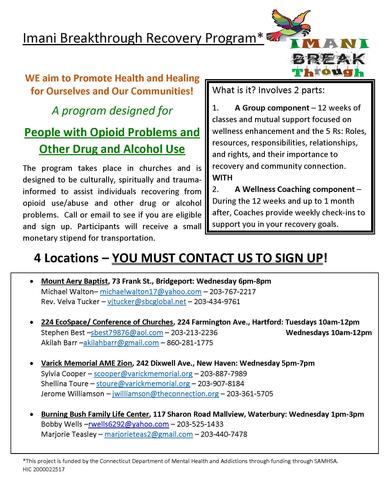
The Imani Breakthrough Recovery Program is a faith-based recovery initiative that takes place in churches and is designed to be culturally, spiritually, and trauma-informed, to assist individuals recovering from opioid use/abuse and other drug or alcohol problems. It involves 2 parts:
- A group component – 12 weeks of classes and mutual support focused on wellness enhancement and the 5 Rs: Roles, resources, responsibilities, relationships, and rights, and their importance to recovery and community connection.
- A wellness coaching component –During the 12 weeks and up to 1 month after, Coaches provide weekly check-ins to support you in your recovery goals.
Call or email to see if you are eligible and sign up. Participants will receive a small monetary stipend for transportation.
4 Locations – YOU MUST CONTACT US TO SIGN UP!
Mount Aery Baptist, 73 Frank St., Bridgeport
Wednesday’s @6pm-8pm
Michael Walton– michaelwalton17@yahoo.com – 203-767-2217
Rev. Velva Tucker – vjtucker@sbcglobal.net – 203-434-9761
224 EcoSpace/ Conference of Churches, 224 Farmington Ave., Hartford
Tuesday’s & Wednesday’s @10am-12pm
Stephen Best –sbest79876@aol.com – 203-213-2236
Akilah Barr –akilahbarr@gmail.com – 860-281-1775
Varick Memorial AME Zion, 242 Dixwell Ave., New Haven
Wednesday’s @ 5pm-7pm
Sylvia Cooper – scooper@varickmemorial.org – 203-887-7989
Shellina Toure – stoure@varickmemorial.org – 203-907-8184
Jerome Williamson – jwilliamson@theconnection.org – 203-361-5705
Burning Bush Family Life Center, 117 Sharon Road Mallview, Waterbury
Wednesday’s @1pm-3pm
Bobby Wells –rwells6292@yahoo.com – 203-525-1433
Marjorie Teasley – marjorieteas2@gmail.com – 203-440-7478
Description of the intervention:
The Imani Breakthrough intervention consists of group based mutual support and recovery/education (meets weekly for 2 hours) with wrap around coaching provided to the participants by the two facilitators/coaches. The facilitators are people with lived experience of substance abuse and members from the church. Churches provide space to hold the weekly groups, assist in organizing the groups and assist with recruitment. Churches have also organized to provide additional assistance to individuals (for example, one church in Hartford, CT, provided a space for the participants to take showers and the elders of the churches donated toiletries and towels for the participants). The sessions take place over 12 weeks.
After the 12 weeks, we have added an Imani Breakthrough NextSteps component which consists of 10 sessions that focus specifically on transitioning people to community and recovery supports and to assist individuals in reaching their other recovery goals. This consists of 10 weekly groups for 1.5 hours. This addition came at the request of the participants and the facilitators of Imani Breakthrough.
The Imani Breakthrough intervention is based on the adaptation of the 8 Dimensions of Wellness (Swarbrick, et al, 2011) group developed by Drs Bellamy and Swarbrick and people with lived experience which was funded by PCORI and the Citizens Enhancement Group developed in Connecticut by Dr. Rowe (Bellamy, in press; Clayton et al., 2013; Rowe et al., 2012; Rowe, 2015). The 8 Dimensions of Wellness is ideal for this project as they discuss ways in which people who are recovering can get in touch with the core areas of wellness that are essential to living a life in recovery: Social, Spiritual, Financial, Physical, Emotional, Occupational, Environmental, and Intellectual. Early results from Bellamy’s study indicate that individuals assigned to the 8 dimensions group had better overall wellness than those in the control group (Bellamy, submitted). These dimensions overlap with five key areas of social determinants of health identified by the Department of Health and Human Services, which was the main focus in adapting this intervention to the Imani Breakthrough: 1) social and community context, 2) health and healthcare, 3) economic stability, 4) neighborhood and built environment, and 5) education. The Citizens components consists of classes specific to the 5 Rs: Responsibility, Resources, Relationships, Roles, Rights and a sense of Belonging. The original Citizens group model was developed for persons with behavioral health disorders and co-occurring addictions re-entering community life from involvement with the criminal justice system, with several classes devoted to issues related to that involvement and its consequences for community inclusion (e.g., addressing the discrimination encountered in employment by ex-offenders). Results from Citizens indicate decrease in substance use and incarceration.
Based on a participatory process with church members and people with lived experience, we combined these interventions to better address the social determinants of health to assist individuals dealing with opioid recovery. For the purposes of the STR project, the adaptions focused more explicitly on substance use and spirituality as understood and addressed within the African American and Hispanic communities.